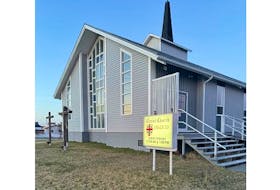During a closed meeting with a small group of student leaders, close to 60 individuals who had been making a vocal demonstration outside Gushue Hall made their way into the junior common room, causing the board to abandon the room and move to another under security escort.
The protesters, meanwhile, many of whom were international students, occupied the building’s lobby, pounding on the walls and yelling protest chants into megaphones as the board continued its meeting.
“It wasn’t as loud inside the room as it might have been outside,” MUN president Gary Kachanoski said afterward.
“The board was able to continue to have its discussions as it should and come to the decision as they needed to given that we’re already a month and a half into the budget year with significant reductions in budgets that we have to deal with.”
The approved budget calls for a $13.5-million reduction in expenditures, starting with a $6-million cut in 2017-18.
“We have a significant job to do to find where we can do those so that there is the least impact on the academy and on our program delivery,” Kachanoski said.
What has raised the ire of the student body, however, is a suite of tuition and fee increases.
While students from this province will continue to benefit from a tuition freeze, new Canadian and international students will see an increase starting in 2018. Current non-Newfoundland and Labrador students will continue to pay the same tuition until 2021.
The original proposal released late last month would have had the increase take effect immediately, but Kachanoski says the purpose of an open Senate committee meeting and town hall meeting for students, staff and faculty was to gain an appreciation for the students’ concerns about the options being considered.

“We said, fair enough, we need to keep the tuition the same for those students, there’s a cost to that in not having that implemented out until four years,” he says. “But any new student that comes, it’s fair game to say this is what the tuition will be in 2018 and you can choose to come here because we’ve got great programs and even with that increased cost, we will still be the least expensive program in Canada.”
While the increases are being delayed, an additional $50 per semester student services fee and campus renewal fee of $50 per course for undergraduates and $167 per semester for graduate students will come into effect this fall. Those fees apply to all students, regardless of their residency.
The latter, Kachanoski explains, is a necessary fee that is being used specifically to address the university’s ballooning deferred maintenance, which now stands at close to half a billion dollars.
“We simply can’t continue to offer 21st-century teaching, learning and research in 20th-century infrastructure that is falling apart,” he said.
“It is a modest but necessary fee for us to be able to address safety issues and continue to move forward at least in a systematic way with infrastructure.”
Moreover, the MUN president insists that finding money to address the aging and crumbling facilities has been paramount for the administration for the past few years.
“I think we’ve demonstrated in previous years when the money was coming in, it could have been put to expenditures and wasn’t, we put it into an infrastructure fund and set (it) as a highest priority.”
Alex Noel, chairperson of the Canadian Federation of Students provincial chapter, took part in the pre-meeting and admits to opening the door which allowed for the influx of protesters.
Noel says that after a “thorough and rigorous” presentation offering alternatives to MUN’s own budget was dismissed, something had to be done to show others what was going on inside.
“They would not offer me a real answer, so as somebody that represents all public post-secondary students in Newfoundland and Labrador I was not going to just sit by and allow that meeting to happen when it’s going to have such a detrimental impact on so many people that work and study here,” Noel said.
He also took issue with the fact that the meeting was conducted with only one student representative and no labour representation.
“I did what I felt I had to do at that point.”
The students’ presentation addressed a zero per cent tuition fee increase, proposed alternative options such as further cuts to administrative bloat and asked the board to delay the vote until such time that there was better student representation at the table and more meaningful consultation with stakeholders.
“We’ve been suggesting it for months now and they refused to look at other options,” Noel says.
“They obviously want a more corporate, more private institution for Newfoundland and Labrador and we simply don’t think that is what (the province) needs. We need a public institution that is high quality and universally accessible, and the direction it’s going in right now is not that direction.”
Twitter: kennoliver79









